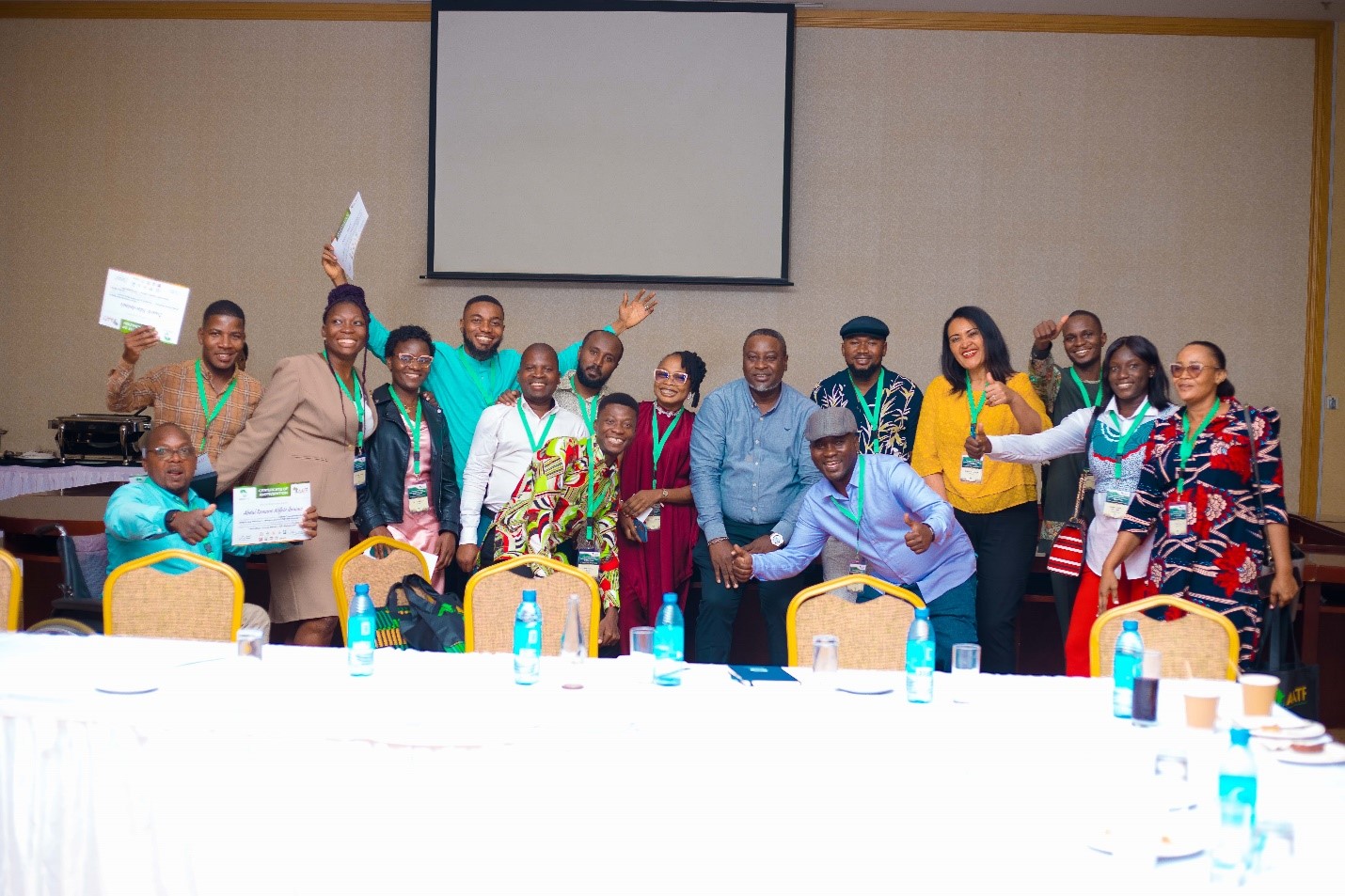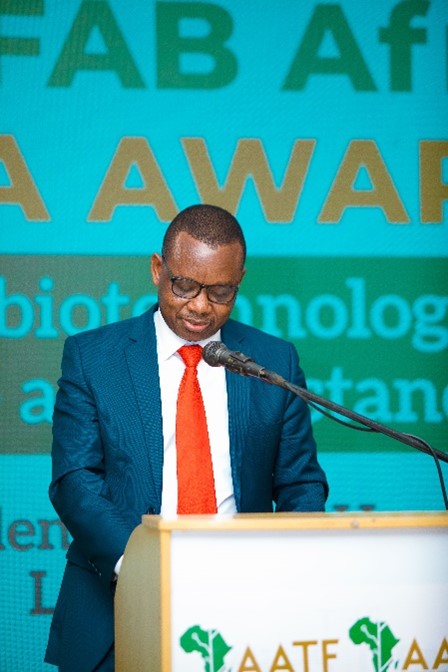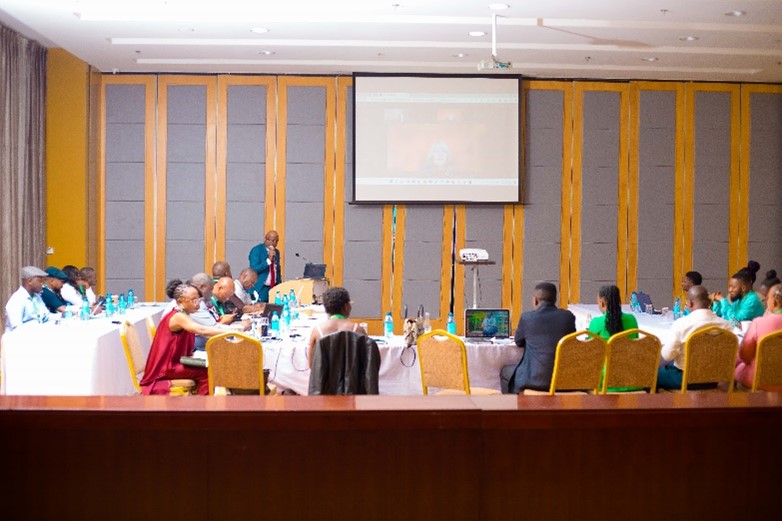
By Mildrine Sabwami, North Rift Radio Kenya -West Pokot County
[Lilongwe, Malawi] Agriculture, biotechnology and science have taken many years to reach their current advanced stage. Now journalists can play a crucial role in spreading messages about the role of this progress in meeting the continent’s food security goals. African farmers currently grow four genetically modified crops: maize, soya bean, cowpea and cotton, which can be used for textiles and to make cotton seed cakes for livestock feed.
The Open Forum on Agricultural Biotechnology (OFAB) Media Awards were created to promote innovations in African agricultural by recognizing accurate and outstanding media coverage. The awards acknowledge journalists who exhibit professionalism and foster public understanding of science and modern agricultural biotechnology.
Peter Mugambi, Director of Corporate Services at AATF, who represented the AATF Executive Director, noted the importance of the OMAs in promoting innovations in African agriculture by recognizing accurate and outstanding media coverage. “Through their responsible, professional, ethical, and impactful reporting, journalists help foster constructive dialogue on modern biotechnology, a field of immense importance for the future of agriculture and food security in Africa,” he said.

Peter Mugambi, Director of Corporate Services at AATF, delivers the welcoming remarks during the OFAB Media Awards held in December 2024 in Lilongwe, Malawi.
By engaging with experts, policymakers, and communities, journalists have brought clarity to complex subjects and empowered audiences to form informed opinions, Mugambi said.
OFAB is inspired by global frameworks like the Sustainable Development Goals (SDGs) and the African Union Agenda 2063. OFAB is dedicated to encouraging journalists to uncover the truth and empower citizens while deepening understanding of agricultural biotechnology to ensure that it is realized equitably and sustainably in the continent, helping it to eventually expand to more African nations.
This year’s awards ceremony at the President Hotel in Lilongwe, Malawi, brought together journalists from Kenya, Ethiopia, Nigeria, Ghana, Burkina Faso, Rwanda, Mozambique, Tanzania and Malawi to acknowledge their indispensable role in accurately educating the public and correcting misinformation about science and agricultural biotechnology in Africa. This education is essential to fostering good decision making among farmers and policy makers to address food insecurity and climate change.
The ceremony coincided with the release of a report from Kenya detailing the millions of dollars lost from delaying and denying farmers’ access to improved seeds, despite their tremendous potential. In Kenya, for example, delaying commercial adoption of insect-resistant Bt maize for five years cost the country’s farmers and consumers USD $67 million.
According to Vitumbiko Chinoko, OFAB Project Manager, over 2,000 journalists have been trained to tell the story of Africa and agricultural biotechnology, thanks to the OFAB media programme that works with journalists to promote their science reporting, which have also strengthened the capacity of 545 editors from reputable media houses. The program has grown to include 10 African nations.

Vitumbiko Chinoko, OFAB Project Manager give opening remarks during the training
The trajectory of the OFAB Media Awards (OMA) demonstrates how the media can help close the knowledge gap between scientific research and the public by interacting with experts, policy makers and communities and providing clarity on difficult topics, Vitumbiko said.
Speaking on behalf of the judges at the awards ceremony, Ochieng Ogodo, a Kenyan-based consulting science editor noted impressive advancements in the entries over the years, stressing the significance of unique narratives, accurate interpretations of data and science for the public and use of images that adhere to digital creativity and quality requirements. The winning journalists engaged in ethical reporting while reporting on technology that can enhance yields and economic activity and address significant threats to food security and agriculture. The journalists’ entries showed an awareness of the science underpinning their work.
Journalists can inform and inspire the world by using their knowledge to highlight the benefits of agricultural science and technology in improving food security, combating poverty, cutting greenhouse gas emissions, lessening micronutrient deficiencies, improving access to food in Africa and reducing imports, which in 2021 totaled $100 billion for Africa.
However, the role of journalists goes beyond simply sharing the story of innovation, resilience and hope. By promoting inclusive dialogue, making sure that every voice is heard and valued and highlighting the successes of scientists and farmers, journalists can inspire confidence in agricultural biotechnology and its potential to improve food security and farmers’ livelihoods.
…….Ends……
########
About AATF (www.aatf-africa.org)
Founded in 2003 to address Africa’s food security prospects through agricultural technology, AATF believes that the agricultural sector is a key foundational pillar as Africa consolidates its economic growth and carves out its new position as a major global economic powerhouse and the next growth market in the world. It was formed in response to the need for an effective mechanism that would facilitate and support negotiation for technology access and delivery and formation of appropriate partnerships to manage the development & deployment of innovative technologies for use by smallholder farmers in SSA.
For more information contact:
Mr Verenardo Meeme, OFAB Africa Programme Officer at AATF. Email address v.meeme@aatf-africa.org, Mobile: +254110597670


















































































